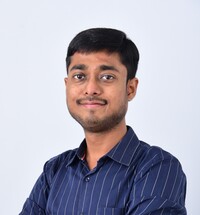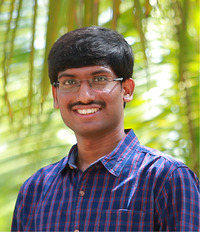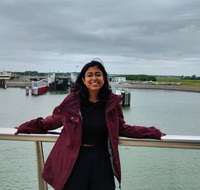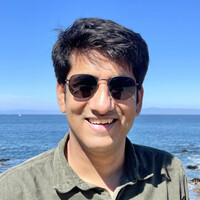Talks
- Ajit Rajwade (CSE @ IITB): An introduction to graph learning
- Saurav Prakash (EE @ IITM): Efficient Solutions for Machine Learning at the Edge
- Subrahmanya Swamy Peruru (EE @ IIT Kanpur): Cascade Bandits for Cognitive Radio Networks: Minimizing Probing Cost through Sequential Learning
- Shubhada Agrawal (ECE @ IISc): How Many Samples Are Necessary? Tight Bounds for Sequential Hypothesis Testing with KL-inf and e-Processes
- Danish Pruthi (CDS @ IISc): Plagiarism in AI Generated Research
Ajit Rajwade
An introduction to graph learning
In many applications, the values of a signal are not defined on a regular Cartesian grid, but are instead defined at irregularly spaced time instants or spatial points. In such cases, the signal values are defined on the vertices of the graph whose edges encode similarity relationships between pairs of different nodes. In several domains, the graph edge information itself may not be available and needs to be inferred from observed data defined on the nodes. This talk will survey existing techniques for graph learning from such data, driven by different kinds of assumptions on the graph signals and the graph edges. Some practical applications will also be covered. Avenues for future work including questions on sample complexity will be briefly discussed. We will conclude with the concept of simplices and hypergraphs, and learning of simplices and hypergraphs from data.
 Ajit Rajwade is a Professor in the Department of
Computer Science and Engineering at IIT Bombay. He obtained his
bachelors degree from the University of Pune, Pune (India), his masters
degree from McGill University, Montreal (Canada) and his PhD degree
from the University of Florida, Gainesville (USA) – all in computer
science and engineering. He worked as a postdoctoral researcher in the
Department of EE at Duke University, Durham (USA) prior to joining IIT
Bombay as a faculty member. His research interests are in signal and
image processing and computer vision, with a focus on image and video
restoration, compression and reconstruction, tomography, compressed
sensing and sparse regression. He is also interested in areas of data
science such as probability density estimation, graph signal processing
and group testing. In his areas of interest, he has published more than
60 papers in prestigious international conferences and journals. He is
a senior member of the IEEE and an associate editor of the journals
Signal Processing (Elsevier) and the IEEE Open Journal on Signal
Processing. He is a recipient of two excellence in teaching awards from
IIT Bombay.
Ajit Rajwade is a Professor in the Department of
Computer Science and Engineering at IIT Bombay. He obtained his
bachelors degree from the University of Pune, Pune (India), his masters
degree from McGill University, Montreal (Canada) and his PhD degree
from the University of Florida, Gainesville (USA) – all in computer
science and engineering. He worked as a postdoctoral researcher in the
Department of EE at Duke University, Durham (USA) prior to joining IIT
Bombay as a faculty member. His research interests are in signal and
image processing and computer vision, with a focus on image and video
restoration, compression and reconstruction, tomography, compressed
sensing and sparse regression. He is also interested in areas of data
science such as probability density estimation, graph signal processing
and group testing. In his areas of interest, he has published more than
60 papers in prestigious international conferences and journals. He is
a senior member of the IEEE and an associate editor of the journals
Signal Processing (Elsevier) and the IEEE Open Journal on Signal
Processing. He is a recipient of two excellence in teaching awards from
IIT Bombay.
Saurav Prakash
Efficient Solutions for Machine Learning at the Edge
The rapid growth of edge devices has created a dynamic, AI-powered data ecosystem with significant potential for societal advancement. However, privacy concerns restrict data sharing across multiple owners, hindering the full potential of AI. Furthermore, edge devices often have substantial resource constraints and heterogeneity, severely restricting their ability to handle large models. This talk will provide innovative solutions to overcome these challenges and enable efficient and privacy-preserving ML in diverse edge settings. As a key highlight, we will address the following question: How to enable federated learning of a large global model, when each edge device can only train a relatively much smaller local model?
 Saurav Prakash is an Assistant Professor in the Department of Electrical Engineering (EE) at IIT Madras and affiliated with the Center for Responsible AI (CeRAI). He received his BTech in EE from IIT Kanpur in 2016 and completed his PhD in EE at the University of Southern California (USC) in 2022. Afterwards, he was a postdoctoral researcher at the University of Illinois Urbana-Champaign (UIUC) for a couple of years before joining IIT Madras. His research interests span Information and Coding Theory, Machine Unlearning, Federated Learning, and Hyperbolic Geometry. Among his accolades, he was an Institute for Genomic Biology (IGB) postdoctoral fellow at UIUC, received the Qualcomm Innovation Fellowship in 2021, and was one of the Viterbi-India Fellows in summer 2015.
Saurav Prakash is an Assistant Professor in the Department of Electrical Engineering (EE) at IIT Madras and affiliated with the Center for Responsible AI (CeRAI). He received his BTech in EE from IIT Kanpur in 2016 and completed his PhD in EE at the University of Southern California (USC) in 2022. Afterwards, he was a postdoctoral researcher at the University of Illinois Urbana-Champaign (UIUC) for a couple of years before joining IIT Madras. His research interests span Information and Coding Theory, Machine Unlearning, Federated Learning, and Hyperbolic Geometry. Among his accolades, he was an Institute for Genomic Biology (IGB) postdoctoral fellow at UIUC, received the Qualcomm Innovation Fellowship in 2021, and was one of the Viterbi-India Fellows in summer 2015.
Subrahmanya Swamy Peruru
Cascade Bandits for Cognitive Radio Networks: Minimizing Probing Cost through Sequential Learning
We study opportunistic spectrum access in cognitive radio networks, where a user sequentially probes channels to find an idle one. In each round, channels are probed in a chosen order until a vacant channel is found, incurring a cost equal to the number of probes made. Feedback is partial: only the outcome of probed channels up to the first success (vacant channel) is observed. The objective is to minimize the cumulative probing cost over time. This reduces to learning the optimal channel ordering under uncertainty. We model the problem as a variant of the cascading bandit and develop learning strategies tailored to this setting, providing regret guarantees that quantify their performance over time.
 Subrahmanya Swamy Peruru is currently serving as an Assistant Professor in the Department of Electrical Engineering at the Indian Institute of Technology Kanpur. Prior to joining IIT Kanpur, he was part of the Machine Learning R&D team at Pramati Technologies. He received his MS (by Research) and PhD from the Department of Electrical Engineering at IIT Madras, and his B.Tech. in Electronics and Communication Engineering from Sastra University, Thanjavur. His research interests span wireless networks, machine learning, and probabilistic graphical models.
Subrahmanya Swamy Peruru is currently serving as an Assistant Professor in the Department of Electrical Engineering at the Indian Institute of Technology Kanpur. Prior to joining IIT Kanpur, he was part of the Machine Learning R&D team at Pramati Technologies. He received his MS (by Research) and PhD from the Department of Electrical Engineering at IIT Madras, and his B.Tech. in Electronics and Communication Engineering from Sastra University, Thanjavur. His research interests span wireless networks, machine learning, and probabilistic graphical models.
Shubhada Agrawal
How Many Samples Are Necessary? Tight Bounds for Sequential Hypothesis Testing with KL-inf and e-Processes
Sequential hypothesis testing is a fundamental tool in signal processing, statistics, and machine learning. It enables decisions to be made from streaming data while controlling errors. But what is the minimum number of samples that you need to make such decisions with high confidence?
In this talk, we will see two new tight lower bounds on the stopping times of power-one sequential tests that guarantee small false positive rates and eventual detection under the alternative. These results extend the classical works (Wald, Farrell) to modern, fully nonparametric composite settings, using an information-theoretic quantity, which we call KL-inf, the minimal KL divergence between the null and alternative sets. We will also construct matching optimal tests using modern tools like e-processes, which enable sequential testing procedures that adapt to complex models and achieve near-optimal sample complexity.
 Shubhada Agrawal is an Assistant Professor at the Indian Institute of Science, Bengaluru, in the dept. of Electrical Communication Engineering (ECE). She received her Ph.D. in Computer and Systems Science from the Tata Institute of Fundamental Research, Mumbai, and her undergraduate degree in Mathematics and Computing from IIT Delhi. She was a postdoc in the department. of ISyE at Georgia Tech, and in the dept. of Statistics & Data Science at Carnegie Mellon University. Her research interests lie broadly in applied probability and sequential decision-making problems like sequential hypothesis testing, multi-armed bandits, and lately, reinforcement learning.
Shubhada Agrawal is an Assistant Professor at the Indian Institute of Science, Bengaluru, in the dept. of Electrical Communication Engineering (ECE). She received her Ph.D. in Computer and Systems Science from the Tata Institute of Fundamental Research, Mumbai, and her undergraduate degree in Mathematics and Computing from IIT Delhi. She was a postdoc in the department. of ISyE at Georgia Tech, and in the dept. of Statistics & Data Science at Carnegie Mellon University. Her research interests lie broadly in applied probability and sequential decision-making problems like sequential hypothesis testing, multi-armed bandits, and lately, reinforcement learning.
Danish Pruthi
Plagiarism in AI Generated Research
Automating scientific research is considered the final frontier of science. Recently, several papers claim autonomous research agents can generate novel research ideas. Amidst the prevailing optimism, we discover that, concerningly, a considerable fraction of such research documents are smartly plagiarized. In this talk, I will share details about our effort to measure the extent of plagiarism in AI-generated research.
 Danish Pruthi is an Assistant Professor at the Indian Institute of Science (IISc), Bangalore. He received his Ph.D. from the School of Computer Science at Carnegie Mellon University. He is broadly interested in the areas of natural language processing and deep learning, with a focus towards inclusive development and evaluation of AI models. He completed his bachelors degree in computer science from BITS Pilani, Pilani. He is also a recipient of the Schmidt Sciences AI2050 Early Career Fellowship, Siebel Scholarship, the CMU Presidential Fellowship and industry awards from Google and Adobe Inc. Until recently, his legal name was only Danish—an “edge case” for many deployed NLP systems, leading to airport quagmires and, in equal parts, funny anecdotes.
Danish Pruthi is an Assistant Professor at the Indian Institute of Science (IISc), Bangalore. He received his Ph.D. from the School of Computer Science at Carnegie Mellon University. He is broadly interested in the areas of natural language processing and deep learning, with a focus towards inclusive development and evaluation of AI models. He completed his bachelors degree in computer science from BITS Pilani, Pilani. He is also a recipient of the Schmidt Sciences AI2050 Early Career Fellowship, Siebel Scholarship, the CMU Presidential Fellowship and industry awards from Google and Adobe Inc. Until recently, his legal name was only Danish—an “edge case” for many deployed NLP systems, leading to airport quagmires and, in equal parts, funny anecdotes.